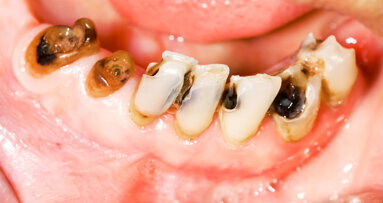EDINBURGH, UK: A study by researchers at the University of Edinburgh has shown that a natural chemical related to those found in liquorice root could help prevent tooth decay. The plant product acts against harmful mouth bacteria and could improve oral health if added to oral care products by helping to prevent the build-up of plaque, the researchers said.
The biological compound, which is similar to chemicals found in liquorice root, is known as trans-chalcone. The British study found that it blocks the action of a key enzyme that allows bacteria to thrive in oral cavities.
The bacteria—Streptococcus mutans—metabolise sugars from food and drink, producing a mild acid and leading to the formation of plaque. Without good dental hygiene, the combination of plaque and mouth acid can lead to tooth decay.
The researchers found that blocking the activity of the enzyme prevents bacteria forming a protective biological layer (a biofilm) around themselves. Plaque is formed when bacteria attach themselves to teeth and construct biofilms. Preventing the assembly of these protective layers would help stop bacteria forming plaque, the research team said.
The team worked out the 3-D structure of the enzyme, called Sortase A, that allows the bacteria to form biofilms. By doing this, the researchers were able to identify how trans-chalcone prevents the enzyme from functioning.
Their study is the first to show how trans-chalcone prevents bacteria from forming biofilms. Oral care products that contain similar natural compounds could help people improve their dental hygiene, the researchers stated. “This exciting discovery highlights the potential of this class of natural products in food and healthcare technologies,” emphasised Dr Dominic Campopiano from the University of Edinburgh’s School of Chemistry, who led the study.
“We were delighted to observe that trans-chalcone inhibited Sortase A in a test tube and stopped Streptococcus mutans biofilm formation. We are expanding our study to include similar natural products and investigate if they can be incorporated into consumer products,” Campopiano said.
The study, titled “Molecular basis of Streptococcus mutans Sortase A inhibition by the flavonoid natural product trans-chalcone”, was published online in the Chemical Communications journal on 18 May.
LONDON, UK: Though the relative benefits of chewing gum are often subject to debate, a number of studies have shown that the sugar-free varieties can ...
LONDON, UK: Despite worldwide efforts to improve oral health, a global study has found that 35 per cent of the world’s population currently suffer ...
MANCHESTER/CAMBRIDGE, UK: Over half a million deaths per year result from malaria, caused by parasites of the genus Plasmodium, and with increasing ...
YORK, UK: Fear of the dentist is something some people suffer from more than others. With multiple reasons for dental anxiety and its effects, there is ...
CARDIFF, UK: Together with Norwegian biopharmaceutical company AlgiPharma, researchers at Cardiff University have been working on new drugs to combat ...
EDINBURGH & GLASGOW, UK: Brushing twice a day is usually considered the most effective measure to maintain oral health in children. New research in ...
LONDON, UK/AMSTERDAM, Netherlands: A test that measures the levels of five chemicals in the breath has shown promising results for the detection of cancers ...
BIRMINGHAM, England: Diabetes is one of the most common chronic conditions in Europe and is strongly associated with periodontitis. An estimated one in ...
BRIGHTON – A musician and a dental professional from England have developed a musical formula that encourages children to brush their teeth ...
Live webinar
Tue. 24 February 2026
6:00 pm UTC (London)
Prof. Dr. Markus B. Hürzeler
Live webinar
Tue. 24 February 2026
8:00 pm UTC (London)
Prof. Dr. Marcel A. Wainwright DDS, PhD
Live webinar
Wed. 25 February 2026
4:00 pm UTC (London)
Prof. Dr. Daniel Edelhoff
Live webinar
Wed. 25 February 2026
6:00 pm UTC (London)
Live webinar
Thu. 26 February 2026
1:00 am UTC (London)
Live webinar
Tue. 3 March 2026
4:00 pm UTC (London)
Dr. Omar Lugo Cirujano Maxilofacial
Live webinar
Wed. 4 March 2026
1:00 am UTC (London)
Dr. Vasiliki Maseli DDS, MS, EdM



 Austria / Österreich
Austria / Österreich
 Bosnia and Herzegovina / Босна и Херцеговина
Bosnia and Herzegovina / Босна и Херцеговина
 Bulgaria / България
Bulgaria / България
 Croatia / Hrvatska
Croatia / Hrvatska
 Czech Republic & Slovakia / Česká republika & Slovensko
Czech Republic & Slovakia / Česká republika & Slovensko
 France / France
France / France
 Germany / Deutschland
Germany / Deutschland
 Greece / ΕΛΛΑΔΑ
Greece / ΕΛΛΑΔΑ
 Hungary / Hungary
Hungary / Hungary
 Italy / Italia
Italy / Italia
 Netherlands / Nederland
Netherlands / Nederland
 Nordic / Nordic
Nordic / Nordic
 Poland / Polska
Poland / Polska
 Portugal / Portugal
Portugal / Portugal
 Romania & Moldova / România & Moldova
Romania & Moldova / România & Moldova
 Slovenia / Slovenija
Slovenia / Slovenija
 Serbia & Montenegro / Србија и Црна Гора
Serbia & Montenegro / Србија и Црна Гора
 Spain / España
Spain / España
 Switzerland / Schweiz
Switzerland / Schweiz
 Turkey / Türkiye
Turkey / Türkiye
 UK & Ireland / UK & Ireland
UK & Ireland / UK & Ireland
 International / International
International / International
 Brazil / Brasil
Brazil / Brasil
 Canada / Canada
Canada / Canada
 Latin America / Latinoamérica
Latin America / Latinoamérica
 USA / USA
USA / USA
 China / 中国
China / 中国
 India / भारत गणराज्य
India / भारत गणराज्य
 Pakistan / Pākistān
Pakistan / Pākistān
 Vietnam / Việt Nam
Vietnam / Việt Nam
 ASEAN / ASEAN
ASEAN / ASEAN
 Israel / מְדִינַת יִשְׂרָאֵל
Israel / מְדִינַת יִשְׂרָאֵל
 Algeria, Morocco & Tunisia / الجزائر والمغرب وتونس
Algeria, Morocco & Tunisia / الجزائر والمغرب وتونس
 Middle East / Middle East
Middle East / Middle East

















































To post a reply please login or register